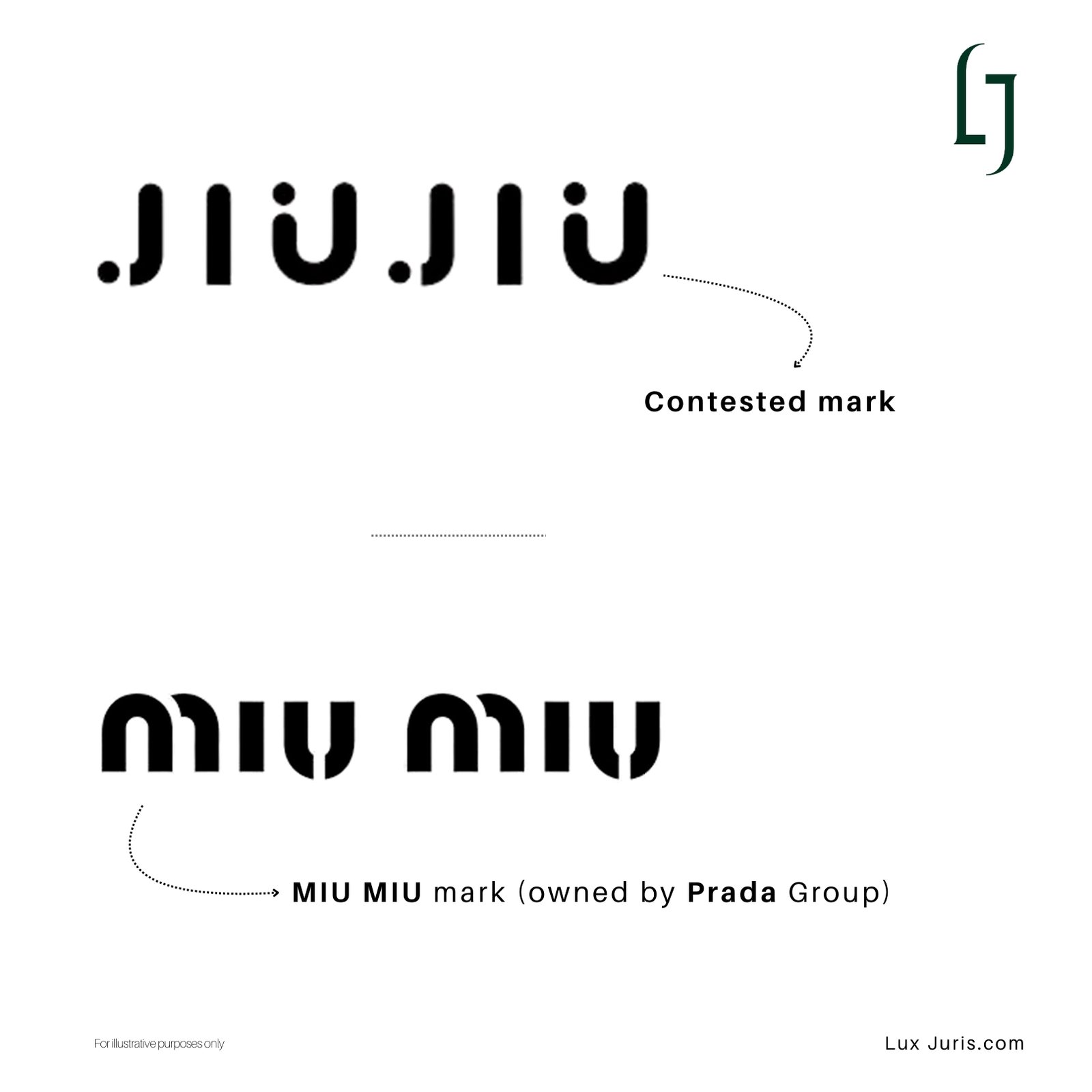On 31 March 2025, the Taiwan Intellectual Property Office (TIPO) rendered a surprising decision by dismissing an opposition by Prada Group to the ‘JIU JIU’ trademark registration owned by Taiwanese company Dijia Co., Ltd. The trademark ‘JIU JIU’, designated for skincare and cosmetics products in Class 3 goods, was challenged by Merchant Pride Co., Ltd (Prada’s Luxembourg-based affiliate) on the grounds of rhyme confusion with their existing luxury brand MIU MIU.
This case highlights the class-specific nature of brand reputation and the evidential challenges faced by global fashion houses when branching out into adjacent industries.
Claims and Allegations
Prada initiated opposition proceedings on JIU JIU’s trademark registration in December 2023 on the grounds of its confusing similarity with their existing luxury brand, MIU MIU. Their arguments focused on phonetic rhyming and a similar repetitive structure, and their use of the trademark on closely related goods was likely to confuse consumers. Given the visual and phonetic similarity, Prada claimed that consumers might mistakenly presume JIU JIU had a connection with MIU MIU.
In response, Dijia Co. argued that the two marks are visually and phonetically distinct. ‘JIU JIU’, pronounced /dʒju dʒju/, differs significantly from ‘MIU MIU’, pronounced /mju mju/, in both spelling and pronunciation. The initial letters ‘J’ and ‘M’ create distinct visual impressions and sounds that, according to Dijia, reduce the risk of confusion.
Core Issues
The key test for trademark opposition under the Taiwan Trademark Act is whether there is a likelihood of confusion to the relevant public. It has been recognized that the use of the two trademarks was for goods in closely related industries and target consumers. However, TIPO values the likelihood of confusion and requires a level of similarity in the trademarks themselves rather than the goods or markets the trademark is used for.
Ruling
Therefore, the decision of TIPO primarily focused on the following aspects:
Visual and Phonetic Dissimilarity
Although the two trademarks share a repetitive structure, the initial character ‘J’ and ‘M’ is visually and phonetically distinctive. The calligraphic and the display styles used in commerce are visually different from each other. Additionally, the phonetical distinctiveness of ‘J’ and ‘M’ reduces the likelihood of customer confusion when combined with the same segment /ju/. Therefore, it is distinguishable between /dʒju/ (‘JIU’) and /mju/ (‘MIU’).
Industry-Specific Reputation and Use
While assessing the likelihood of confusion, the fame of the trademark is valued by both local market and category-specific products. In this case, the ‘JIU JIU’ trademark protects cosmetics and skincare-related products in class 3 under the Taiwanese Trademark Act.


As a widely recognized luxury fashion brand, MIU MIU’s fame and consumer perception are associated with clothes, bags, and runway shows. However, JIU JIU’s use of the trademark in the local market on cosmetics and skincare-related products has no obvious connection with the above products by MIU MIU. Given the lack of such a connection, TIPO found it insufficient to assume customer confusion.

The evidence Prada submitted on MIU MIU’s consumer recognition is insufficient to prove its local perception in the cosmetics and skincare category in Taiwan. Its globally recognized fame and reputation in the fashion industry do not automatically transfer to the Taiwanese beauty industry. This means they must provide evidence of MIU MIU’s cosmetics market in Taiwan to prove their consumer recognition in both the specific industry and jurisdiction.
Local Consumer Perceptions
Legal experts point out that although Prada claims a defence against brand mis-association, local perception of the brand carries more weight than international recognition in such decisions. The absence of evidence such as local advertising to demonstrate Taiwanese consumers’ knowledge of MIU MIU cosmetics, or documentary evidence to prove MIU MIU’s actual sale of beauty products, makes it hard for them to establish their argument on local consumer perceptions. Without establishing local consumer perceptions, TIPO ruled that MIU MIU’s global fame and reputation in the fashion industry are unlikely to extend to the cosmetics industry.
In other words, JIU JIU cannot evoke MIU MIU in the minds of its customers. Therefore, the office decided the opposition should be rejected.
What This Means for Fashion and Beauty Brands
The rejection of Prada’s opposition to the ‘JIU JIU’ mark by TIPO reflects the trend of courts requiring market-specific evidence rather than general recognition of a brand. This means merely claiming the fame and reputation of a brand is not enough in opposition claims. Without localized evidence in a specific industry and consumer perception, even a globally prestigious brand like MIU MIU, with fame and success in the fashion market, is unable to shield a mark from its competitors.
Conclusion
The rejection of TIPO on Prada’s opposition claim on JIU JIU illustrates the visual and phonetic distinctiveness and market-specific evidence outweighs the general claim of a globally recognized brand reputation in trademark opposition claims. To establish a opposition claim, a brand must provide category-specific and localized evidence.
As more luxury brands diversify into cosmetics and personal care, enforcement strategies must evolve accordingly. Success will depend not on general fame, but on the ability to demonstrate clear and specific recognition within the relevant market and consumer group.
Source:
